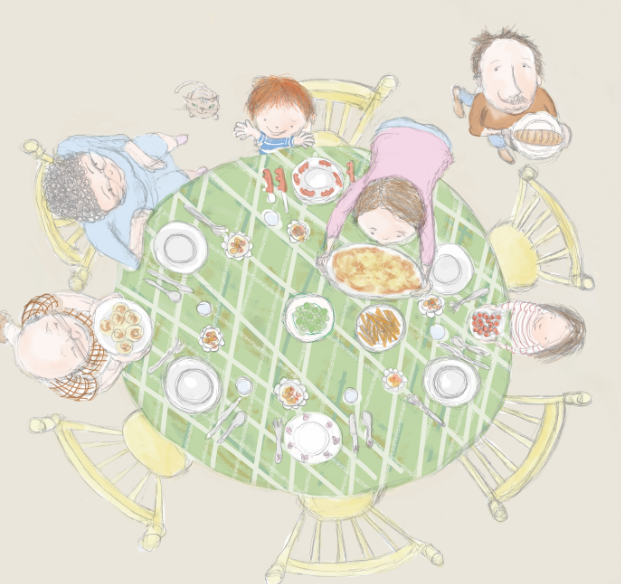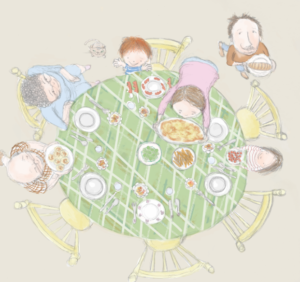
At Let’s Eat! we often get asked by parents and professionals about our feeding approach. After working in the industry for 18 years, I have refined and developed our Let’s Eat! approach so that it continues to be evidence based and clinically delivers the feeding outcomes that parents want.
We use a responsive feeding approach in all our therapy programs. Our framework for this approach is based on the Responsive House model which was developed by myself and my colleague Debbie Alvarez in our professional training company Feeding Therapy Australia. Our feeding masterclasses and workshops now sell out Australia-wide. Why? Because it works!

The house model framework sees the parents as the primary change makers at home with their child’s therapy goals. Equally, the therapy goals are developed by the parents and the child. We encourage the parents to look more broadly than just “eat more fruit, vegetables, and meat”. We want to support them as needed so that their goals build on social inclusion and participation for their child.
Why? Because eating is more than just nutrition, it is about the shared connections that mealtimes bring around the family table both at home but also at school, in the community, and broader such as overseas holidays and celebrations such as Christmas.
Common responsive feeding experts include Ellyn Satter whose theory of “parents provide – children decide” underpins our feeding bi-directional approach. A lot of you may know that the Ellyn Satter Institute recently gave my book “But I’m NOT Hungry for my Dinner” the ESI seal of approval (teal circle on the front cover) – a huge honour in the responsive feeding world. Thank you ESI!
Responsive feeding roots are based on attachment-based parenting which is supported by the World Health Organization. Attachment-based approaches support responding sensitively to the child so as to create a warm and loving relationship between the child and parent. You may have heard of a very well-known responsive parenting program called Circle of Security. I trained in this program a few years ago and its parent coaching and reflecting philosophy (with a “no blame” approach on parents) couldn’t speak more true to me as a feeding therapist.

What about the “therapy”? – At Let’s Eat, the therapy strategies are individualised so that each child who attends is supported with their sensory and motor needs, their anxiety, and communication skills all the while honouring their medical, growth and nutritional needs.
But therapy also considers the family dynamics and relationships. This means that you may also hear us use lots of different names who are all feeding experts including Marsha Dunn Klein, Susanne Evans Morris, Jenny McGlothlin, Grace Wong, Katja Rowell, Melanie Potock, Jo Cormack, Gillian Griffiths, etc (the list is quite long). That’s the individualisation – the extensive postgraduate training that all our team members do in feeding to provide an individualised service for your child. Because every child (whether they are neurotypical or neurodiverse) is unique and special in their own right – so should their therapy strategies be.
Our responsive feeding framework is consistent across our entire caseload – child with feeding difficulties, a fussy eater, a child with delayed chewing, a child with tube weaning goals, a child with oral aversion or even a baby struggling with textures, bottles or even breastfeeding.
We love this approach because responsive feeding is trust-based. It builds the strengths of the parent-child relationship and encourages a child’s intrinsic eating (self-regulation). When all of these pillars are supported, a child’s dietary intake naturally increases, their food interest grows, their chewing skills strengthen, and they slowly but surely achieve their feeding goals.
Here is one thing I need all parents to remember – there will be ups and downs just like anything in life, stand strong to the responsive principles we teach you and you will ride the waves of feeding success and refusal with your child. There is no “magic fix” to feeding, it’s a slow and steady race but didn’t the turtle win in the end? Let’s allow our children to “win” this race too.
Our parent coaching sessions are also integral in this process of celebrating successes and holding your hand in challenging times. And by doing so, you will continue to support your child’s emotional needs and build their inner resilience and strength. And at the end of the day – that’s what we want for our children, not to change them – but to help them grow into the adults they were meant to be.
If you have any questions, reach out at any time.
In the meantime, wishing you happy and connected mealtimes
Val
About the author of this blog post
Valerie Gent is an Australian based Speech Pathologist with 18 years experience in Paediatric Feeding. She owns ‘Let’s Eat! Feeding Therapy’, a Newcastle based service for babies and children with feeding difficulties. Val also co-owns ‘Feeding Therapy Australia’, a professional developing training company for allied health professionals, medical, nursing and teaching staff around Australia in feeding difficulties. Val is currently doing her masters looking at Autism and feeding. She has also recently published a book which is based on the Satter Division of Responsibility. The book is called “But I’m NOT Hungry for my Dinner” and available to purchase online through her website, at local good book stores and on most online websites including Book depository and Amazon.




